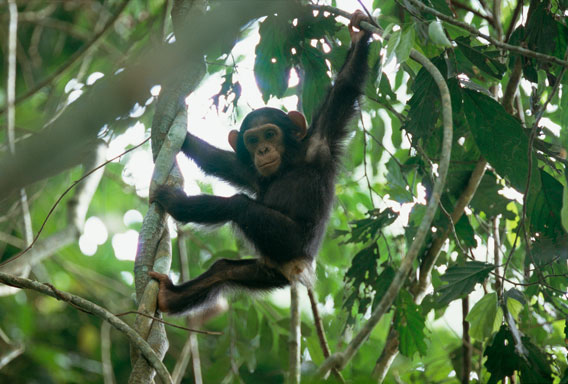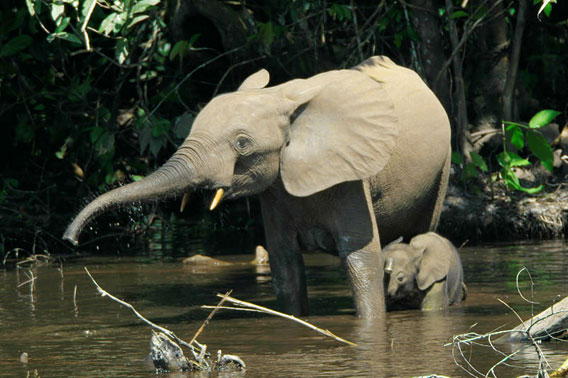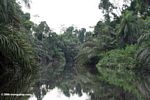
A young “naive” chimp from the Goualougo Triangle. Photo by: Michael Nichols, National Geographic.
The Republic of the Congo has expanded its Nouabalé-Ndoki National Park by 37,295 hectares (144 square miles) to include a dense swamp forest, home to a population of chimpanzees (Pan troglodytes) that show no fear of humans. Known as the Goualougo Triangle, the swamp forest is also home to forest elephants (Loxodonta cyclotis) and western lowland gorillas (Gorilla gorilla gorilla). The expansion of the park to include the Goualougo Triangle makes good on a government commitment from 2001.
“We commend the Republic of Congo for finalizing this critical process to extend the borders of Nouabalé-Ndoki to include the Goualougo Triangle, one of the great wonders of Africa,” Wildlife Conservation Society (WCS) President and CEO Steve Sanderson said in a press release. “In a world of human use, this extraordinary forest is a reminder of Eden, an untouched gem teeming with chimpanzees, gorillas, and forest elephants. It is the definition of wild nature and must be protected.” The WCS has been working in the park since 1993.
The Gualougo Triangle forest is so remote from human settlements, the closest is over 30 miles away, that the chimpanzees have been described as “naive” since they showed no fear, but instead intense curiosity, when the first conservationists and biologists arrived in the area. Chimps in other parts of Africa are wary of humans since they are hunted as bushmeat and impacted by forest destruction.
Research on the chimps has unveiled new insights into the diversity of the ape’s cultures. WCS conservationists Dave Morgan of the Lincoln Park Zoo and Crickette Sanz of Washington University have discovered that the Goualougo chimps use two different tools to get at termites (one for penetrating the nest, the other for gathering termites), a behavior never recorded elsewhere. Jane Goodall visited the site in 2004.
Nouabalé-Ndoki National Park, with the addition of the Goualougo Triangle, now covers 423,870 hectares (1,636 square miles), an area 50 percent larger than Rhode Island. According to WCS, the rainforest park contains over 300 bird species and 1,000 plant species.
The deal to save Gualougo Triangle was brokered between the Republic of Congo government, WCS, and Congolais Industrielle des Bois (CIB), a private logging company, which gave up its rights to log the forest.

Forest elephants in the Mbeli River in the Nouabalé-Ndoki National Park. Photo by: Thomas Breuer.
Related articles
Humans drove rainforest into savannah in ancient Africa
(02/09/2012) Three thousand years ago (around 1000 BCE) several large sections of the Congo rainforest in central Africa suddenly vanished and became savannah. Scientists have long believed the loss of the forest was due to changes in the climate, however a new study in Science implicates an additional culprit: humans. The study argues that a migration of farmers into the region led to rapid land-use changes from agriculture and iron smelting, eventually causing the collapse of rainforest in places and a rise of grasslands. The study has implications for today as scientists warn that the potent combination of deforestation and climate change could flip parts of the Amazon rainforest as well into savannah.
Majority of protected tropical forests “empty” due to hunting

(02/08/2012) Protected areas in the world’s tropical rainforests are absolutely essential, but one cannot simply set up a new refuge and believe the work is done, according to a new paper in Bioscience. Unsustainable hunting and poaching is decimating tropical forest species in the Amazon, the Congo, Southeast Asia, and Oceana, leaving behind “empty forests,” places largely devoid of any mammal, bird, or reptile over a few pounds. The loss of such species impacts the whole ecosystems, as plants lose seed dispersers and the food chain is unraveled.
Forest elephant populations cut in half in protected area
(11/14/2011) Warfare and poaching have decimated forest elephant populations across their range with even elephants in remote protected areas cut down finds a new study in PLoS ONE. Surveying forest elephant populations in the Okapi Faunal Reserve in the Democratic Republic of Congo, researchers have found that the population has fallen by half—from 6,439 to 3,288—over the past decade in the park.

